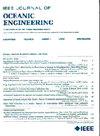Adaptive Enhancement of an Active Sonar Classifier Using Mode-Connectivity-Based Fine-Tuning Under Data Set Shifts
IF 5.3
2区 工程技术
Q1 ENGINEERING, CIVIL
引用次数: 0
Abstract
In supervised-learning-based active sonar classification overcoming data set shifts through standard fine-tuning is challenging due to the limited size and diversity of active sonar data sets. To address this challenge, we propose a robust fine-tuning method using mode connectivity (RoFT-MC), which mitigates two key problems in standard fine-tuning: catastrophic forgetting and negative transfer. RoFT-MC constructs a mode connectivity curve between two independently pretrained models. For adaptation, the curve parameters are optimized using in situ test data rather than training data. RoFT-MC effectively adapts to the shifted test data set while maintaining its performance on the training data set by ensuring that the fine-tuned weights remain on the curve. In addition, we utilize a feasible fine-tuning data set composed of test clutter samples combined with training target samples instead of unavailable test target samples to avoid biased predictions. In the efficacy examination standard fine-tuning failed to adapt to the shifted test data set, whereas RoFT-MC demonstrated a significant performance improvement. Specifically, RoFT-MC increased the probability of detection from 0.2710 to 0.6438 at a false alarm rate of 0.1, while maintaining comparable performance on the training data set.基于模式连通性的主动声呐分类器在数据集移位下的自适应增强
在基于监督学习的主动声呐分类中,由于主动声呐数据集的规模和多样性有限,通过标准微调克服数据集漂移是一项挑战。为了解决这一挑战,我们提出了一种使用模式连接(RoFT-MC)的鲁棒微调方法,该方法减轻了标准微调中的两个关键问题:灾难性遗忘和负迁移。RoFT-MC构建了两个独立预训练模型之间的模式连通性曲线。为了适应,曲线参数是使用现场测试数据而不是训练数据来优化的。RoFT-MC有效地适应偏移的测试数据集,同时通过确保微调后的权重保持在曲线上,保持其在训练数据集上的性能。此外,我们利用由测试杂波样本和训练目标样本组成的可行微调数据集,而不是不可用的测试目标样本,以避免有偏差的预测。在功效检测标准中,微调不能适应移位的测试数据集,而RoFT-MC表现出显著的性能改善。具体来说,RoFT-MC以0.1的虚警率将检测概率从0.2710提高到0.6438,同时在训练数据集上保持相当的性能。
本文章由计算机程序翻译,如有差异,请以英文原文为准。
求助全文
约1分钟内获得全文
求助全文
来源期刊

IEEE Journal of Oceanic Engineering
工程技术-工程:大洋
CiteScore
9.60
自引率
12.20%
发文量
86
审稿时长
12 months
期刊介绍:
The IEEE Journal of Oceanic Engineering (ISSN 0364-9059) is the online-only quarterly publication of the IEEE Oceanic Engineering Society (IEEE OES). The scope of the Journal is the field of interest of the IEEE OES, which encompasses all aspects of science, engineering, and technology that address research, development, and operations pertaining to all bodies of water. This includes the creation of new capabilities and technologies from concept design through prototypes, testing, and operational systems to sense, explore, understand, develop, use, and responsibly manage natural resources.
 求助内容:
求助内容: 应助结果提醒方式:
应助结果提醒方式:


